Resources
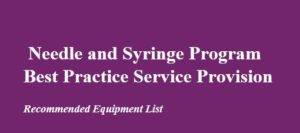
AIVL Needle and Syringe Programs – Recommended Equipment List
National Reports & FrameworksDifferent types of injections require different types of equipment and it is critical that a consistent range of basic injecting equipment be provided across all NSP outlet types to ensure the NSP services can support the diversity of injecting drug use.
This factsheet outlines AIVL’s recommended equipment for NSPs across Australia and their function. It provides an overview of equipment that AIVL recommends NSPs stock as well as providing guidance to NSP staff on providing the right equipment for the right injection.
Download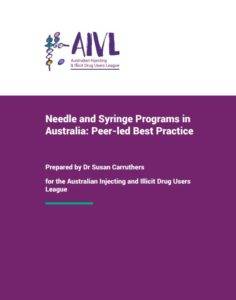
AIVL Needle and Syringe Programs in Australia: Peer-led Best Practice
National Reports & FrameworksAs part of its 2017-18 work plan, AIVL sought to develop a Needle and Syringe Program (NSP) Best Practice Guide that detailed the needs of people who inject drugs, service delivery models across Australia and practice considerations for service providers that are informed by peer experience and led by peer intelligence. This project built on findings from a National NSP Forum that AIVL held in Sydney in 2015 and from a 2017 literature review that detailed NSP service models and international NSP best practice.
The aim of the consultations for this project:
• Understand the key issues in the delivery of services through NSPs
• Identify gaps in current knowledge and understanding of NSP Service Delivery
• Understand the advantages and disadvantages related to each of the NSP service models (peer-based,
secondary and pharmacy based NSPs)
• Establish an evidence base for the development of NSP Best Practice Guidelines for use in all states and
territories of Australia
• Establish a group of key informants to support the development of Best Practice Guidelines for NSPs
in Australia
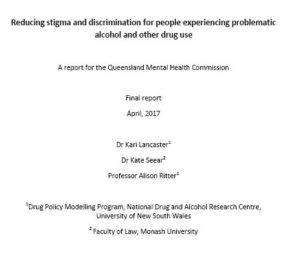
Reducing stigma and discrimination for people experiencing problematic alcohol and other drug use
ResourcesThis project aimed to understand experiences of stigma and discrimination for people experiencing problematic alcohol and other drug (AOD) use in Queensland. Specifically, the research examined:
- Experiences of stigma and discrimination;
- The potential for legislation to be stigmatising;
- The settings and sectors in which stigma and discrimination occur;
- The impacts of stigma and discrimination on health and wellbeing and in particular on recovery and the ability to reconnect with the community; and
- Circumstances where stigma is not experienced, and evidence of what works to address stigma and discrimination.
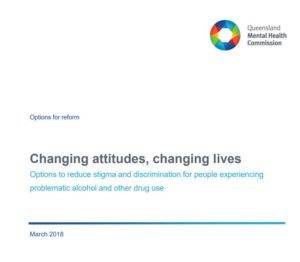
Changing attitudes, changing lives – options to reduce stigma and discrimination for people experiencing problematic AOD use
ResourcesThis report has been prepared by the Queensland Mental Health Commission (the Commission) to examine ways to reduce stigma and discrimination which has a negative impact on the mental health and wellbeing of people experiencing problematic alcohol and other drug use.
Download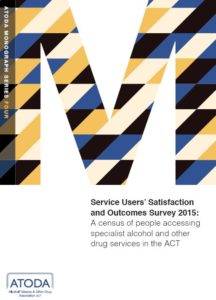
Service Users’ Satisfaction and Outcomes Survey 2015 (ATODA Monograph Series Four)
ResourcesA Service Users’ Satisfaction and Outcomes Survey (SUSOS) was conducted across the ACT Health-funded and – delivered specialist alcohol and other drug organisations, both government and non-government, on a single day. It largely replicated the ACT Service Users’ Satisfaction Surveys conducted in 2009 and 2012. This is a report on the findings of the 2015 Survey. It also provides comparisons between the three survey waves.
Download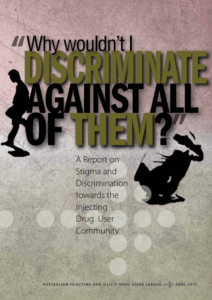
“Why wouldn’t I discriminate against all of them?”: A Report on Stigma and Discrimination towards the Injecting Drug User Community
ResourcesIn 2009 AIVL received funding to commission market research with a view to determining the feasibility of developing a national campaign to redress the stigma and discrimination routinely faced by people who inject drugs. The primary objectives were to learn more about the perceptions of the general community—and some subsections of it, such as the medical profession—towards our community. This new information could then be used in determining how the community might respond to messages aimed at countering the misconceptions and prejudices associated with people who inject drugs. The market research report, published in 2010, was the catalyst for production of this document.
View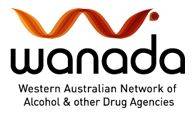
Reducing Stigma and Discrimination Relating to Alcohol and other Drugs in Western Australia
ResourcesStigma and discrimination related to alcohol and other drug use can impact on prevention, education and treatment – with repercussions for the whole community.
The Social Inclusion Action Research Group (SIARG) is a partnership between WANADA, Mental Health Commission (formerly Drug and Alcohol Office – DAO) and the wider WA alcohol and other drug sector that aims to reduce alcohol and other drug-related stigma and discrimination.
View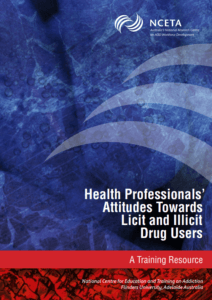
Health Professionals’ attitudes towards licit and illicit drug users: A training resource
ResourcesPeople with AOD-related problems are often stigmatised by the public as well as by health and human services professionals. Negative attitudes toward people with AOD-related problems can be a major barrier to receipt of optimal care. This can occur, for example, when the stigma associated with AOD problems is reflected in workers’ views about the deservingness of AOD clients for high quality and timely care.
NCETA has undertaken a number of projects to help raise awareness of the negative impact of adverse attitudes and the stigmatised nature of AOD work.
View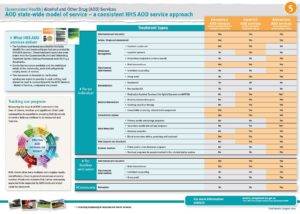
POSTER 4.2 – AOD state-wide model of service – a consistent HHS AOD service approach (Page 2)
Qld frameworksA Poster Series for Queensland Alcohol and Other Drugs (AOD) Treatment Service Delivery Framework.
OUR SHARED MISSION
To provide effective, evidence-informed
prevention, treatment and harm reduction responses
that build a Queensland community with the lowest possible
levels of alcohol, tobacco and drug-related harm.
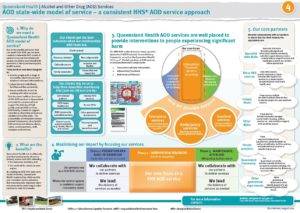
POSTER 4.1 – AOD state-wide model of service – a consistent HHS AOD service approach (Page 1)
Qld frameworksA Poster Series for Queensland Alcohol and Other Drugs (AOD) Treatment Service Delivery Framework.
OUR SHARED MISSION
To provide effective, evidence-informed
prevention, treatment and harm reduction responses
that build a Queensland community with the lowest possible
levels of alcohol, tobacco and drug-related harm.
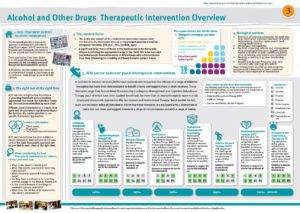
POSTER 3 – Alcohol and Other Drugs Therapeutic Intervention Overview
Qld frameworksA Poster Series for Queensland Alcohol and Other Drugs (AOD) Treatment Service Delivery Framework.
OUR SHARED MISSION
To provide effective, evidence-informed
prevention, treatment and harm reduction responses
that build a Queensland community with the lowest possible
levels of alcohol, tobacco and drug-related harm.
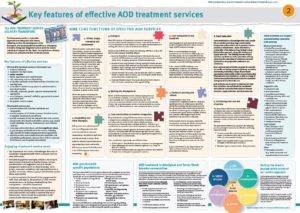
POSTER 2 – Key features of effective AOD treatment services
Qld frameworksA Poster Series for Queensland Alcohol and Other Drugs (AOD) Treatment Service Delivery Framework.
OUR SHARED MISSION
To provide effective, evidence-informed
prevention, treatment and harm reduction responses
that build a Queensland community with the lowest possible
levels of alcohol, tobacco and drug-related harm.